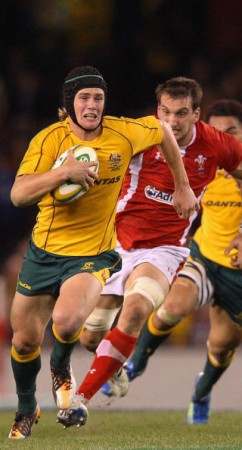By Paul Williams
What have we learned about the Welsh team during the three game series?
The tour should be viewed as a success.
IT WON’T be of course. A three nil series defeat in Australia will be greeted as a failure by many. And if you are dealing purely in wins and losses, that judgement is unequivocal. However, what the Welsh team and their supporters now consider a success is very different from what was considered successful a decade ago. Ten years ago Wales were grateful to be within ten points of southern hemisphere opposition. Five years ago narrow defeats at home were accepted. Having made a World Cup semi-final and a won a Grand Slam in the last 12 months, Wales are now cursing if they lose to southern hemisphere teams, even when playing on their turf. Wales have lost these three tests by a combined points difference of just 11 – an average margin of under four points a game, and they lost both the second and third tests in the closing minutes. Both the Welsh team and their supporters keep moving the goalposts as to what is acceptable for this team. It is a very good sign. I wonder where the goal posts will be this time next year.
No Roberts. No backline.
The vacuum left by Jamie Roberts’ absence has been marked. Without him the Welsh backline simply does not function. Pre-tour, Roberts was criticised for his limited passing ability and running angles – he doesn’t have a plan B the wags carped. However, you don’t often need a Plan B when Plan A is 6’4 and 17st 4lbs. His ball carrying is the Welsh blueprint. All set piece running patterns and initial phases are built around his ability to get over the gainline. His impact on the opposition’s 10 and 12 is often so inhumane that it flies in the face of his ambitions to become a doctor. Put it this way, Berrick Barnes’s performances over the past few weeks would have been very different if Roberts had been repeatedly running down his channel. As it was, his defence was rarely tested. There is no more important cog in the Welsh team than Jamie Roberts. There, I said it.
Halfpenny is a world class goal kicker.
Leigh Halfpenny is fast becoming a goal kicker with Neil Jenkins levels of reliability. He only missed one kick during the entire Australian tour striking an upright. He has the best kicking percentage of all the kickers who were involved in fixtures with the ‘big three’. The All Blacks goal kickers had a combined kick success rate of 78%, Ireland 61%, Australia 79%, England 80% and South Africa 52% – Halfpenny kicked at 94%. His stats are made even more impressive by the distance from which he takes many of his kicks. Many goal kickers have an overinflated kicking percentage due to the fact that they shun long range opportunities and opt only for shots that are safely within range. Halfpenny turns down nothing and misses little. It will add an interesting dynamic to next year’s Lions selection at fullback. Many would currently opt for Kearney at 15, but this time next year, Halfpenny may be the best goal kicker in the British Isles.
Priestland, the scapegoat.
No position in Welsh rugby receives as much scrutiny as the No 10 shirt. It is for this reason that Rhys Priestland has carried the can for the first two Welsh losses. In fact he’s carried so many cans that at times it’s looked like he’s putting out the recycling. In truth Priestland’s performances in the first two tests weren’t his best. However, he has been playing outside a backrow creating slow ball at the breakdown, a scrum-half who doesn’t help matters and an inside-centre stepping into the international arena with ‘L’ plates. Priestland’s performance in the third test proved that he is a test quality outside-half. With near parity in possession and territory, his high balls were accurate and his tactical and clearance kicking was assured. He also dealt with slow ball effectively, often carrying it into contact himself. Priestland showed strength of character in the third test and hopefully his detractors will show patience.
Set piece errors cost Wales games.
We’re not talking about the scrum here. The Welsh scrummage is highly reliable. In fact they only lost two on the entire tour. The same cannot be said of the lineout. Over the three tests it operated at 81%, the lowest percentage of all the nations involved in test matches with the ‘big three’. It restricted Wales’ ability to control territory on this tour and as a result has limited their try count. The problem has also spread to kick restarts. Although not technically considered a set-piece, kick restarts essentially involve the same mechanic as a lineout, which may explain why Wales had such a problem with it in the third test. Restart turnovers are lethal – they occur when your defensive line is at its weakest. Three of your forwards are involved in the lifting pod and are therefore unable to quickly readjust into the defensive line. Your outside half is generally sitting deep to make a clearance kick and the rest of the backs are set up for a kick chase. The result is a panicky scramble defence which often concedes a penalty or a scrum, usually just outside the 22. It cost Wales 6 points in the 3rd test. Not ideal.








